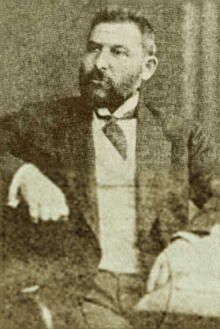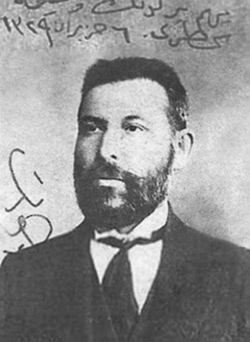Abdullah Cevdet
| Dr. Abdullah Cevdet | |
|---|---|
|
Dr. Abdullah Cevdet | |
| Born |
9 September 1869 Arapgir, Ottoman Empire |
| Died |
29 November 1932 (aged 63) Istanbul, Turkey |
Resting place | Merkezefendi Cemetery, Istanbul |
| Nationality | Turkish |
| Ethnicity | Kurdish |
| Education | Medicine |
| Alma mater | Istanbul Military Medical Academy |
| Occupation | Physician, writer and intellectual |
| Movement | Young Turks(1895-1909),[1] Committee of Union and Progress (1889-1908), Democratic Party (1908-1911) |

Abdullah Cevdet (Ottoman Turkish: عبدالله جودت; 9 September 1869 – 29 November 1932) was an Ottoman Turkish intellectual and medical doctor of Kurdish descent. He was one of the founders Committee of Union and Progress. In 1908, he turned against the Committee of Union and Progress and joined Democratic Party which merged with the Freedom and Accord Party in 1911.[2] He was also a poet, translator, radical free-thinker, and an ideologist of the Young Turks until 1908.
Cevdet was influenced by Western materialistic philosophies and was against institutionalized religion. He published articles on socio-religious, political, economic, and literary issues in the periodical İçtihat, which he founded in 1904 in Geneva and used to promote his modernist thoughts. He was arrested and expelled from his country several times due to his political activities and lived in Europe, in cities including London and Paris.
The overall goal of early Young Turks such as Cevdet was to bring to end the absolutist regime of Sultan Abdul Hamid II. For this purpose, Cevdet and four other medical students (including Ibrahim Temo) at the Military Medical Academy in Istanbul founded the secret "Committee of Union and Progress" (CUP) in 1889. Initially with no political agenda, it became politicized by several leaders and factions and mounted the Young Turk Revolution against Abdul Hamid II in 1908. However, Abdullah Cevdet cut his ties with the CUP soon after 1908, instead promoting his secular ideas until his death. In 1908 he joined the Ottoman Democratic Party which was founded against the CUP (Ottoman Turkish: Fırka-i İbad; Turkish: Osmanlı Demokrat Fırkası).[2]
He was also involved in several Kurdish organisations formed after the 1908 revolution. He was involved in the Society for the Propagation of Kurdish Education, founded in 1910, and wrote for two journals published by the Kurdish Students' Hope Society. Prior to World War I, his involvement with the Kurdish associations did not contradict his Ottomanism. However, after 1918, he joined the Society for the Advancement of Kurdistan (Turkish: Kürdistan Teali Cemiyeti), which did advocate Kurdish self-rule.
Cevdet was tried several times in the Ottoman Empire because some of his writings were considered as blasphemy against Islam and the prophet Muhammad. For this reason, he was labelled as the "eternal enemy of Islam" (Süssheim, EI) and called "Aduvullah" (the enemy of God).[3] His most famous court case was due to his defense of the Bahá'í Faith in his article in İçtihat on 1 March 1922.
Cevdet was one of the intellectuals who influenced Mustafa Kemal Atatürk in his reforms of secularization in Turkey. Despite the vast differences between them, Cevdet also had some friendly connections with the Islamist theologian Said Nursi, as they shared a belief in Ottomanism and interest in the advancement of Kurdish people.[4]
Death
Left alone in his final years, Abdullah Cevdet died at the age of 63 on 29 November 1932. His body was brought for religious funeral service to Hagia Sophia, which was still used as a mosque at that time. However, nobody claimed his coffin, and it was expressed by some religious conservatives that he "did not deserve" Islamic funeral prayer. Following an appeal of Peyami Safa, a notable writer, the funeral prayer was performed. His body was then taken by city servants to the Merkezefendi Cemetery for burial.[5]
References
- ↑ A Biographical Dictionary of Albanian History, Robert Elsie, 2012, Page 436
- ↑ 2.0 2.1 http://www.akarhuseyin.com/?page_id=514
- ↑ Karl Süssheim, “Abd Allah Djewdet’, Encyclopedia of Islam (EI1; Supplement), Leiden/Leipzig, 1938, 55–60.
- ↑ Martin van Bruinessen Vom Osmanismus zum Separatismus: Religiöse und ethnische Hintergründe der Rebellion des Scheich Said (PDF; 260 kB), S. 18
- ↑ "Abdullah Cevdet" (in Turkish). Yazar Mezar. Retrieved 18 October 2011.
- Şerif Mardin, Jön Türklerin Siyasi Fikirleri, 1895–1908, Istanbul 1964 (1992), 221–50.
- idem, Continuity and Change in the Ideas of the Young Turks, expanded text of a lecture given at the School of Business Administration and Economics Robert College, 1969, 13–27.
- Frank W. Creel, The program and ideology of Dr. Abdullah Cevdet: a study of the origins of Kemalism in Turkey (unpublished PhD thesis), The University of Chicago, 1978.
- M. Sukru Hanioglu, Bir siyasal düşünür olarak Doktor Abdullah Cevdet ve Dönemi, Istanbul, 1981.
- idem, Bir siyasal örgüt olarak Osmanlı Ittihad ve Terakki Cemiyeti ve Jon Türklük, Istanbul, 1986.
- idem, The Young Turks in Opposition, Oxford University Press, 1995.
- Necati Alkan, "The eternal enemy of Islam: Abdullah Cevdet and the Baha'i Religion", Bulletin of the School of Oriental and African Studies, 68:1, 2005, 1-20.
|
